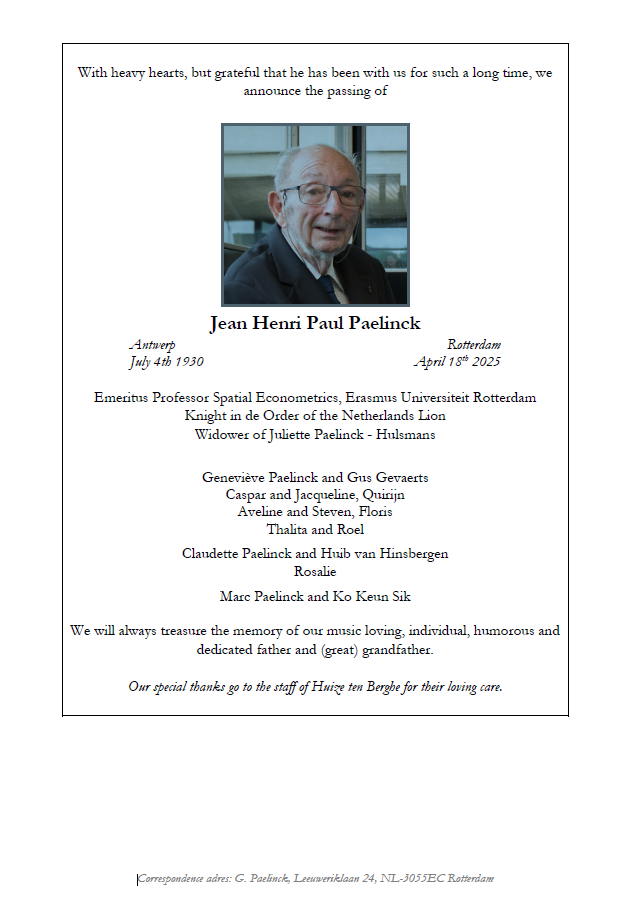In Memoriam Jean Paelinck
When I think of the quintessential well-rounded scholar, Jean Paelinck would be primus inter pares. He was an incredibly well-read, erudite person who was also very committed to regional science and the nascent field of spatial econometrics. His spatial econometric model, FLEUR, captured these two fields of interest perfectly as they mutually reinforced what was at the time, an important innovation in our goal to find an analytical framework to understand how multi-economy systems functioned. However, Jean was always interested in what others were doing and he delighted in attending meetings where he could engage in conversation with as many as possible, especially if he was able to nurse a glass of wine during the discourse. He was our pianist-in-residence and always enjoyed performing during the lunch celebrations and he provided a very moving performance during a memorial service for Walter Isard. Regional Science rewarded him with a Founders Medal, a Fellowship and the Paelinck Prize – but he rewarded us with his presence and multi-decade commitment to our field. Thank you, Jean.
Geoffrey J.D. Hewings, Emeritus Director, Regional Economics Applications Laboratory.
________________
Jean Paelinck was a wonderful insightful scholar who fathered spatial theory in regional economics, applied regional science and specifically spatial econometrics. He was a prolific publisher across a wide range of topics but he always had a strong mathematical or statistical analytic bent to his regional research. He was a truly gifted intellectual who besides his prodigious scholarship wrote poetry for all occasions and was a wonderful composer and pianist. He composed original marching scores for many organizations including Regional Science International. His gentle and gentlemanly ways were widely appreciated. He will be deeply missed. Regards
Kingsley Haynes, University Professor Emeritus, Schar School of Policy and Government
________________
One of the most distinguished regional scientists, Jean Paelinck, passed away on April 18, 2025, at the age of 94.
Jean Henri Paul Paelinck was born on July 4, 1930, in Antwerp, Belgium. He began his long standing academic journey at the University of Liège, where he first studied law; he earned his Doctor of Law degree maxima cum laude in 1953, and later received additional master’s degrees from the same university. His early promise led him to further studies, inter alia at the University of Cambridge in the Department of Applied Economics (1958–1959), where he worked with the famous Richard Stone (Nobel Laureate, 1984).
Paelinck’s academic career spanned several countries and institutions. He held teaching and research positions at several universities, including Lille, Namur, Paris, and the Université Catholique de Louvain. Most notably, from 1969 to 1995, he served as a professor in theoretical spatial economics at the Erasmus University in Rotterdam. His work during this period laid a solid foundation for his lifelong commitment to rigorous, quantitative-analytical and interdisciplinary research in regional science.
In May 1974, while addressing the annual meeting of the Dutch Statistical Association, Paelinck introduced the term “spatial econometrics.” This new field sought to explore the spatially interdependent dimensions of economic behavior and regional development—a concept that would come to influence both academic inquiry and public policy all over the world. His 1979 book, Spatial Econometrics, co-authored with his colleague Leo Klaassen, became a cornerstone text and has since been cited as central to the emerging field of spatial econometrics. Another seminal book of Jean Paelinck (co-authored with Peter Nijkamp) was the analytical textbook on Operational Theory and Method in Regional Economics (1975), which was intended to be a contemporaneous successor of Walter Isard’s core text on Methods of Regional Analysis (1960). A more recent noteworthy title is Non-standard Spatial Statistics and Spatial Econometrics (2011), a book co-authored with Dan Griffith. This work delves into advanced statistical techniques tailored to address the complexities that arise in spatial data analysis—techniques that often did not fit the classical frameworks of spatial statistics.
Jean Paelinck has over many years been an original thinker in quantitative regional science. For example, his interesting studies on international and interregional trade patterns served to find a linkage between the pioneering works of Nobel Laureate Jan Tinbergen (and his colleague Henk Bos) and the early spatial hierarchy systems studies by August Lösch, termed by him ‘Tinbergen-Bos models’. In a later stage of his life, he was also engaged as a visiting professor at the Schar School of Policy and Government at George Mason University, as a close colleague of the late Roger Stough and Kingsley Haynes. Over the course of his career, he authored more than 55 books and over 300 articles, reflecting a deep and sustained engagement with econometric methods in regional science.
Beyond teaching and research, Jean Paelinck contributed also his expertise to international organizations. He served in advisory roles for the United Nations, the European Union, and other international bodies concerned with economic and regional development. His scholarly contributions were recognized through numerous honors—including seven honorary doctorates, the RSAI Founder’s Medal, and a knighthood in the Order of the Netherlands Lion. In 2014, the Regional Science Association International established the Jean Paelinck Award to honor his pioneering work on quantitative regional science.
His legacy lives on not only in his extensive body of work, but also in the many students, colleagues, and international policy-analysts who continue to draw inspiration from his dedication to understanding the spatial complexities of economic life.
Peter Nijkamp, Free University. Faculty of Economics and Business Administration. Department of Spatial Economics
